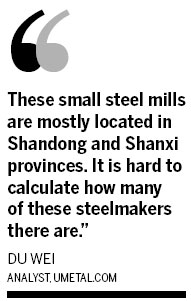Steel mills told to halt production
|
|
|
Workers weld steel rods at the coal exchange center in Taiyuan, Shanxi province. In addition to small steel mills, some small coking coal and electrolytic aluminum makers will also be forced to close, the government said on Tuesday.[China Daily] |
Small steel mills with steel blast furnaces less than 400 cubic meters in size are being told by the central government to shut down production by the end of next year.
The State Council, China's cabinet, published a document on Tuesday, saying all steel blast furnaces in this size class will be closed to rein in overcapacity and force upgrades in the industry.
"These small steel mills are mostly located in Shandong and Shanxi provinces," said Du Wei, an analyst with industry consultancy firm Umetals.com.
"It is hard to calculate how many of these steelmakers there are, but the new move will help rein in overcapacity in the steel industry," Du said.
The industry has been facing oversupply problems which have weighed on steel prices and squeezed profit margins, China's steel lobby China Iron and Steel Association warned.
 China's crude steel production capacity was forecast at 700 million tons at the end of 2009, while China's steel output stood at 567.84 million tons last year.
China's crude steel production capacity was forecast at 700 million tons at the end of 2009, while China's steel output stood at 567.84 million tons last year.
The central government will also close down outdated production capacity in other sectors including power, coal, coking coal, ferroalloy, calcium carbide and nonferrous metals to save energy and reduce emissions, it said on Tuesday.
Enterprises flocking to boost markets in industries such as coal have been common in recent years, with the government then stepping in to correct potential overcapacity and obsolete production capacity.
The country will shut down coal-fired power generators that generate more than 50 gigawatts, and seal 8,000 small coal mines this year, the document said.
It also said all mill furnaces below 6,300 kilovolts that make ferroalloy and calcium carbide will be shuttered by the end of this year. Small coking coal and electrolytic aluminum makers will also be closed, the document said.
Any region that hasn't completed the aforementioned targets on time, the central government will strictly control the region's projects assessments, by withholding approvals for new investments, the document said.
It also proposed that local governments should raise the standards of project assessments, and strictly verify environmental assessments.
Local governments should not approve construction projects or provide land permits to overcapacity industries.
Advanced companies are encouraged to merge with outdated enterprises, the document added.
 0
0 



![Workers weld steel rods at the coal exchange center in Taiyuan, Shanxi province. In addition to small steel mills, some small coking coal and electrolytic aluminum makers will also be forced to close, the government said on Tuesday.[China Daily] Workers weld steel rods at the coal exchange center in Taiyuan, Shanxi province. In addition to small steel mills, some small coking coal and electrolytic aluminum makers will also be forced to close, the government said on Tuesday.[China Daily]](http://images.china.cn/attachement/jpg/site1007/20100407/0019b91ed7d10d265c2004.jpg)



